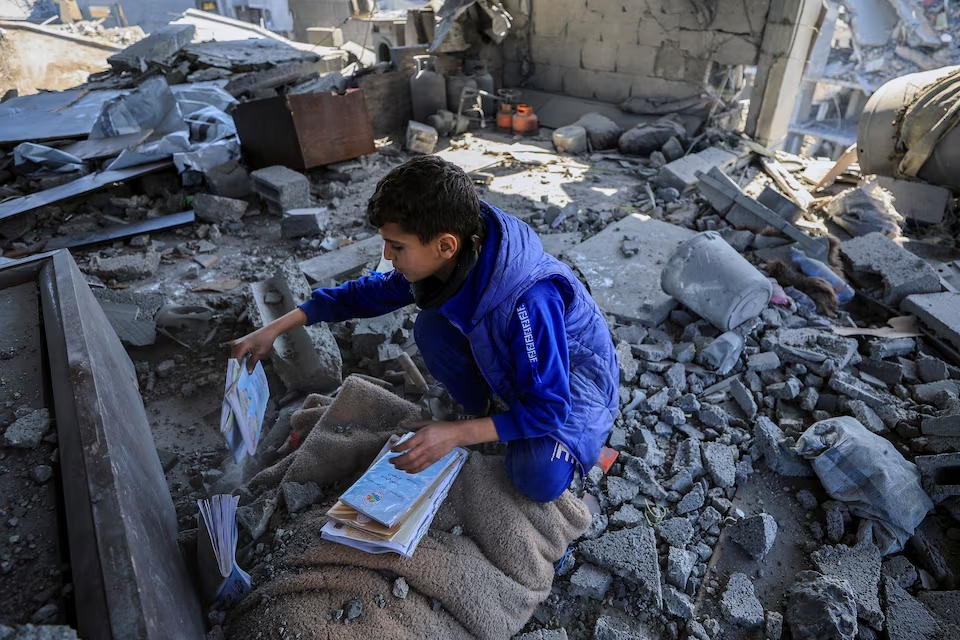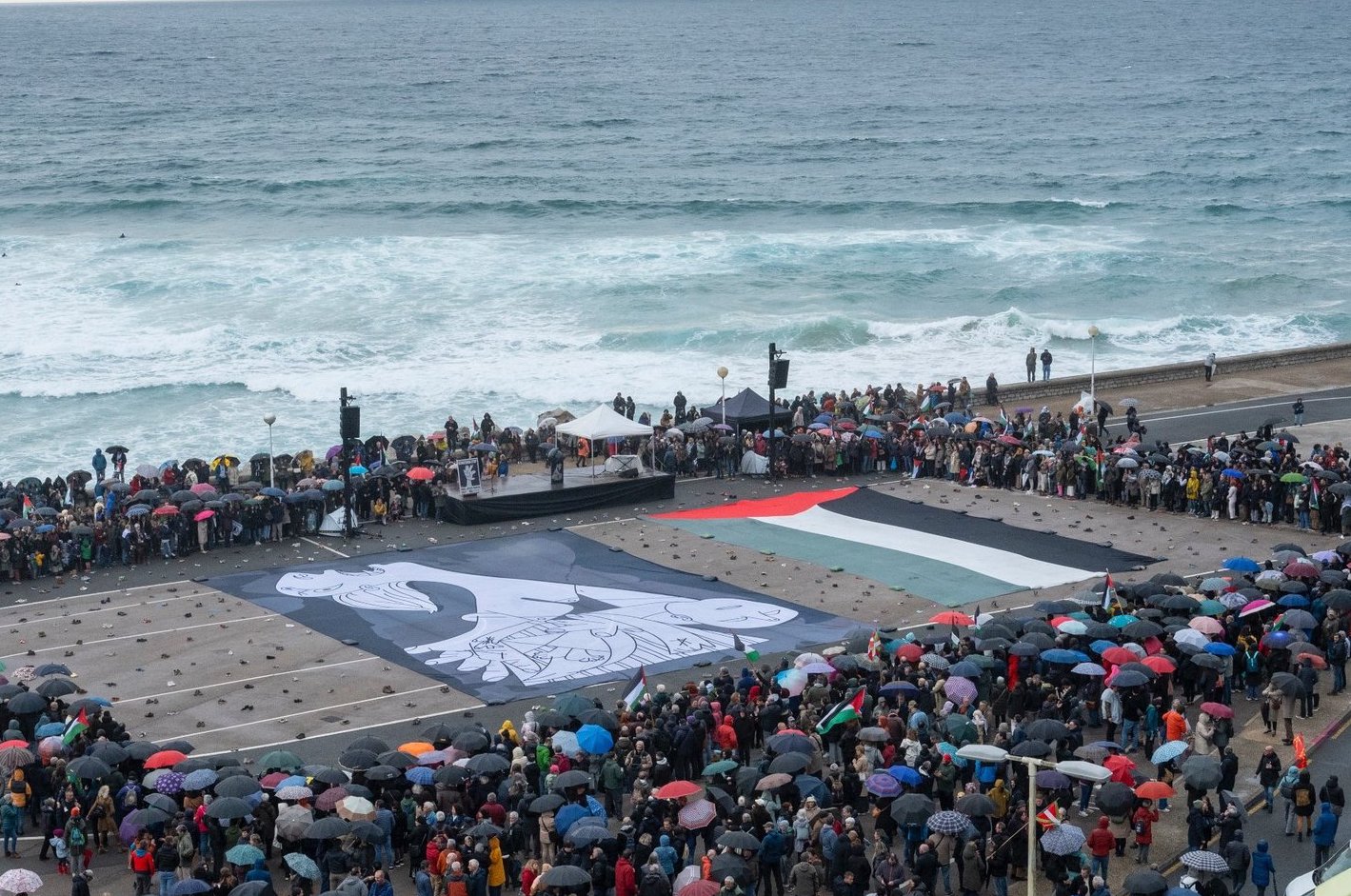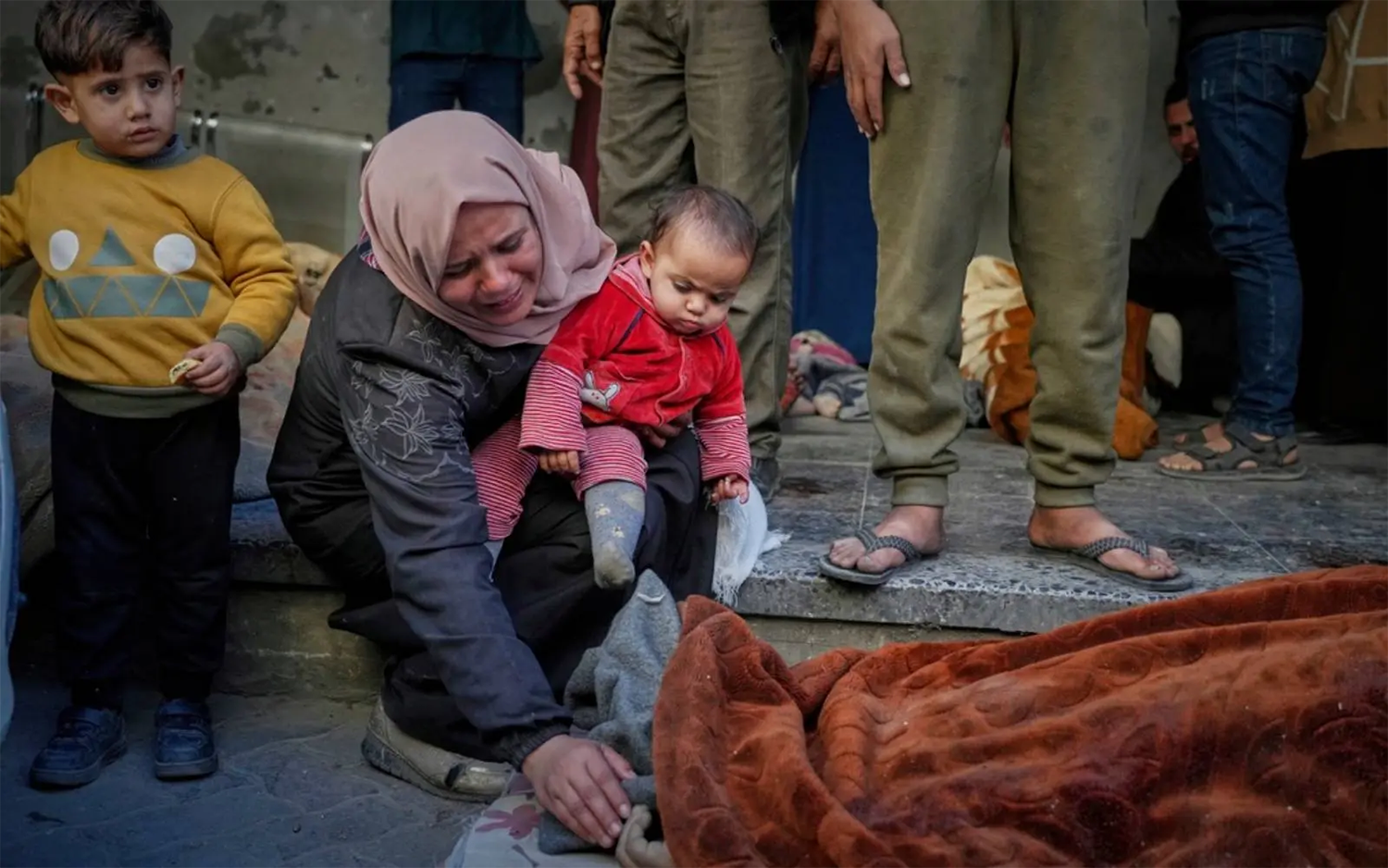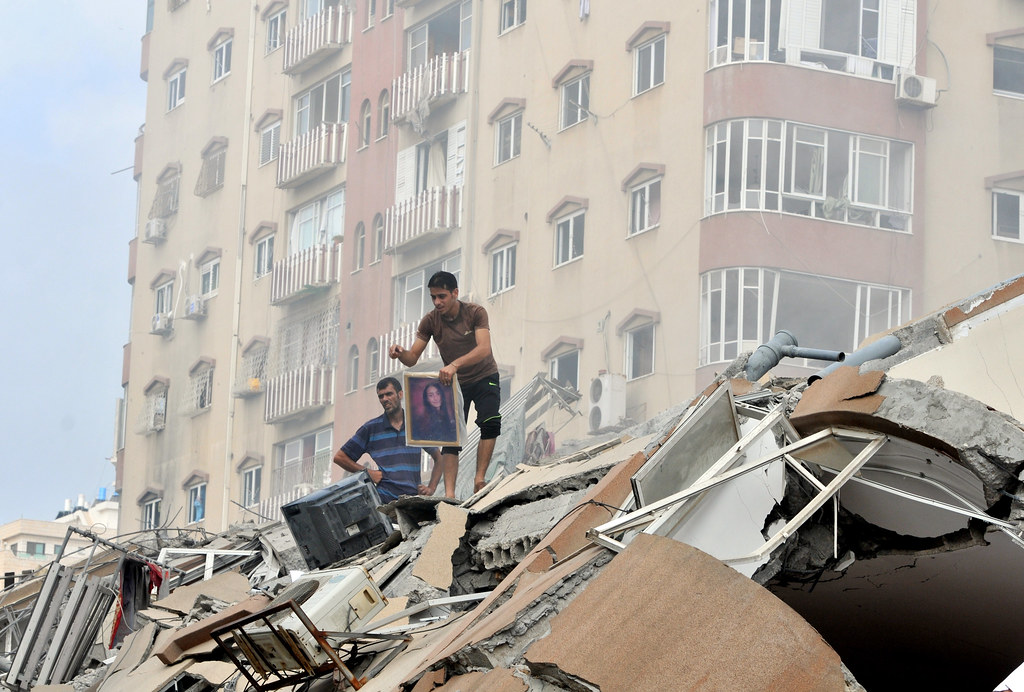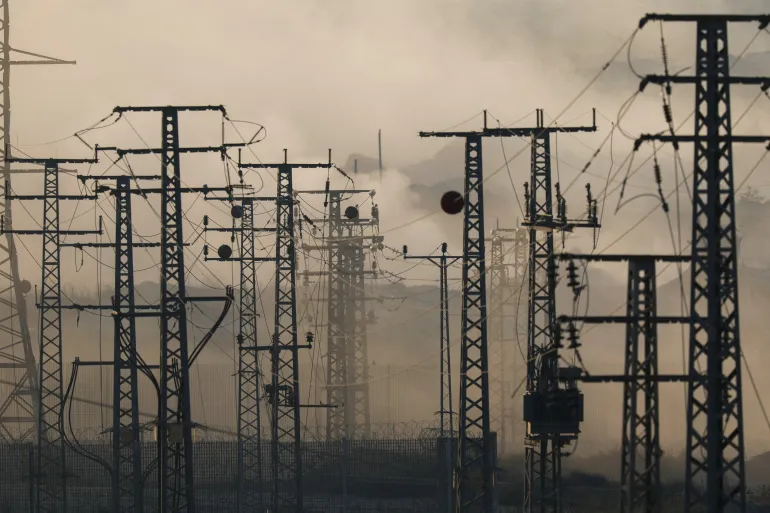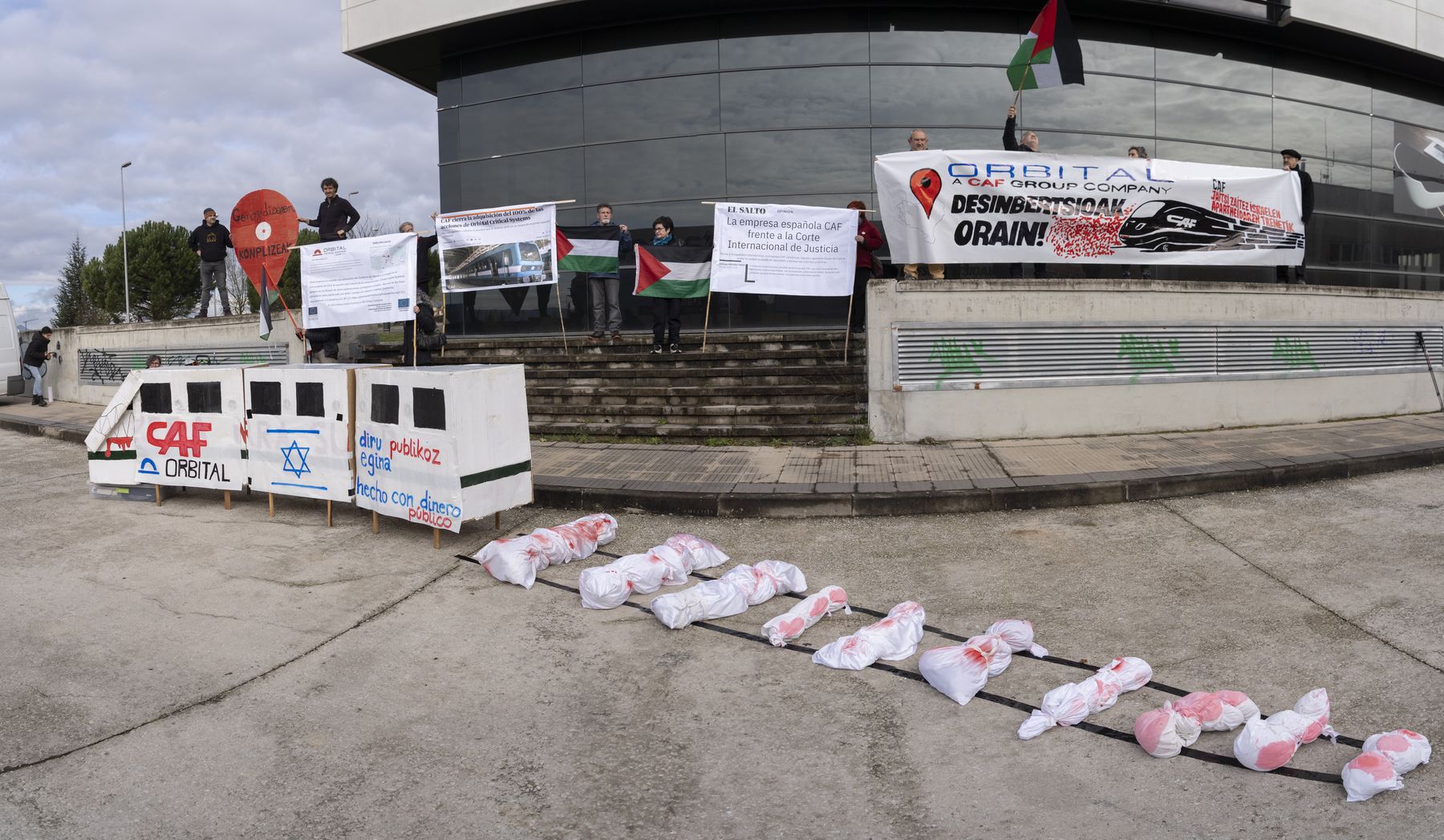"5% of the Palestinian land is in the hands of the Palestinians and they also want to take that away from us"
- On the occasion of the International Day of Solidarity with Palestine, the internationalist association Tadamun has organised many activities in Usurbil. In the Sutegi hall, Aritz Saidi, Gabriel Ezkurdia and Fayez Badawi discussed the current state of affairs in the Palestinian and Middle East conflicts. ARGIA took the opportunity to interview the historic militant of the Popular Front for the Liberation of Palestine.

At the beginning of his speech, he mentioned the Nakba, the forced exodus of the Palestinians following the 1948 Arab-Israeli War. Like thousands of families in northern Palestine, your family was part of that exodus.
I was born in a Palestinian refugee camp in Lebanon in 1955. It was a terrible camp made up of chabolas, and we lived some 40,000 Palestinians. There came my family after a paramilitary group of Zionists destroyed our village in the midst of the 1948 conflict.
My family lived in a town between Haifa and Acre. After the Nakba, our home country came under Israeli rule. Ours is the story of the Palestinian families who are neither from the West Bank nor from Gaza and who were expelled. We are still living 8 million refugee Palestinians in many countries of the world today. My mother has always felt guilty about forced expulsion, she says several times: “After hearing the raw news coming from Germany, we opened the doors to the settlers, offering them the opportunity to work on our lands.” It is clear that the tragedy that followed did not await her.
You were born in a camp. What is the life of the refugee like?
Life in the camp was very hard, especially when the weather didn't help. The rain and cold penetrated all the reindeer of the cabins. The camp was destroyed in 1976 by Falangist forces in the Lebanese Civil War. I had to flee again with the family, until we settled in Atila camp. My family first lived in 1982 the massacre that the Falangist forces committed in Xatila with the support of Israel. Many family acquaintances were killed.
All that seemed very young to you.
I remember that at the age of 12, at the camp school, the Lebanese armed forces arrested the fellow runners around the Nakba. I also started distributing propaganda, propaganda was from the FPLP movement, and to realize it, I was an active militant. When I was 18 years old, I was already young, had a great influence on me to get to know the work of political leader and writer Ghassan Kanafani. Reading his works, I deepened the consciousness of class and nation. Kanafani’s work was essential for young Palestinian refugees to join the fight.
You are currently one of the international representatives of the Popular Front for the Liberation of Palestine (PFLP).
Ours is one of the great movements of Marxist ideology in the Arab world, but above all we are a branch of Palestinian resistance. Representatives of a people who have not lost the passion for resistance. In contrast to what many international media say, resistance is becoming more and more united and that means reinforcing all movements. In Gaza, where historically our movement has been weaker, we are increasingly present.
“Israel no longer respects the limits set by the Oslo Treaty in the West Bank, which was detrimental to the Palestinians”
That is well known to Israel, an example of this is the persecution that our militants in the West Bank have been particularly suffering in recent months or the murder of the leader of the Islamic Jihad in Gaza, Baha Abu al Ata. The return of selective killings against the Palestinian resistance at the moment is no surprise, Israel has detected that agreements are being reached between the various factions of the resistance and with that it wants to be broken.
You mentioned the persecution of the citizens of the West Bank.
When we talk about the West Bank, it has to be said that the signing of the Oslo Pact by some Palestinian leaders in 1993 was a wrong decision. The pact allowed for the creation of a false and weak government called the Palestinian National Authority, which would put control of the territory and all the important powers in Israel’s hands. This clearly divided us, and in the meantime Israel is moving forward with its intention of recovering the entire West Bank.
Since Trump came to power with the support of the international Zionist lobby, the Israeli Government has accelerated the construction of illegal settlers on Palestinian territory. Israel no longer respects the limits set by the Oslo Treaty, which was detrimental to the Palestinians, but detrimental to them. It is a systematic theft of resources such as land or water, as well as the destruction of olive trees, one of the pillars of the economy. Today, 5% of Palestine is in the hands of the Palestinians and they also want to take away this from us.
The murder of Baha Abu al Ata, the bombings... In recent weeks, Gaza has become a combative for the umpteenth time.
Gaza is the world ' s largest concentration camp, on the orders of the relatives who suffered the Holocaust. Gaza is experiencing a serious humanitarian crisis in every respect. However, the resistance of the Gazanies remains, and hundreds of rockets launched by the Palestinian militias in this latest conflict have far outstripped the defence system known as the Burniz dome in Israel. If the gauze is attacked, the Palestinians will respond. The inhabitants of the Gaza Strip have no choice but that of Hamburg.
In view of this, the strongest weapons we have as a liberation movement are unity and internationalism. We must continue to internationalise the consequences of the occupation. This internationalism has been the collaboration that is emerging among the progressive movements of the Arab world. They have understood that the Israeli occupation not only harms Palestine, but is an important step in tackling the repression and the challenges we face.
The war continues in Syria, a historic ally of Palestine.
Israel has for years acted militarily and politically against the allies of Palestine. He has failed in his plans. Hezbollah, Syria or Iran have been the destinations of Israel. At the root of the Syrian conflict is also the Palestinian cause. Just below is the attempt by the United States and Israel to balkanise the Middle East. In this context, we must place the Syrian civil war or military actions against Hezbula. In conclusion, I would like to stress the strength of the boycott, a very effective tool for dealing with the oppression that we suffer through small actions in Europe and the Basque Country.
Aurten "Israel Premier Tech" txirrindularitza talde israeldarra ez da Lizarraldeko Miguel Indurain Sari Nagusia lasterketara etorriko. Berri ona da hori Palestinaren askapenaren alde gaudenontzat eta munstro sionistarekin harreman oro etetea nahi dugunontzat, izan... [+]
Zer esango zenioke Palestinako aktibista bati aurrez aurre izango bazenu? Ni mutu geratu nintzen Iman Hammouri nire herrian bertan aurkeztu zidatenean. Eskerrak andre nagusi bat gerturatu zitzaigula eta solaskide roletik itzultzailearenera pasa nintzela.
Palestinako Popular... [+]
Gure Haurrak ere Badira ekimenak deituta, Israelek azken egunetan Gazan hildako gehienak haurrak direla salatu dute. Gobernuei eta erakundeei Israelekin harreman oro etetea ere exijitu diete, "genozidio honen aurka argi eta tinko" lerratu daitezen.
No other land dokumentalaren zuzendari Hamdan Ballal kolono sionistek jipoitu zuten astelehenean bere herrian, beste hainbat palestinarrekin batera, eta Israelgo militarrek eraman zuten atxilo ondoren. Astarte goizean askatu dute.
Asteartean menia apurtu zuenetik gutxienez 650 palestinar hil dituzte sionistek, Al Jazeeraren arabera. Netanyhauren gobernuak Shin Bet zerbitzu sekretuetako buru Ronen Bar kaleratzeko erabakia hartu du, baina Auzitegi Gorenak kaleratzea geldiarazi du.
Milaka pertsona bildu dira larunbat honetan Palestinako herriari elkartasuna adierazteko eta “Israelek Gazan egindako genozidioa” amaitzeko eta Benjamin Netanyahuren gobernuak su-etenari berriro ekiteko eskatzeko. Gernika-Palestina herri ekimenak deitu du martxa,... [+]
Palestinarekin Elkartasuna plataformak osteguna, ostiral eta larunbatean eginen ditu protestak, Israel genozida. Palestinar erresistentzia aurrera! lelopean. Gernika-Palestina-k ere manifestazio nazionala antolatu du larunbaterako Donostian. Euskal Herriko Kontseilu Sozialistak... [+]
500 palestinar hil ditu Israelek, horietatik 130 baino gehiago adin txikikoak, su etena apurtu eta bigarren egunean. “Hasiera baino ez” dela ohartarazi du Netanyahuk.
Israelek eraso masiboak abiarazi ditu berriro ere Gaza osoan: Khan Younis eta Rafan Gaza hegoaldean, Gaza Hirian iparraldean eta eta Deir el-Balah-n erdialdean. "Familiak seme-alaben gorpuzkiak eskuetan zituztela iristen ziren ospitalera", adierazi du lekuko batek.
Israelek Gazarako su-etenaren urraketa ugari egin ditu urtarrilaz geroztik: zerrendako palestinarrak oinarrizko laguntzarik jaso gabe egon dira ia astebetez, eta Netanyahuk azken egunetan mehatxu egin ondoren, argindarrik gabe utzi ditu orain. Dohan ordezkari estatubatuarrekin... [+]
Asteburua baino lehen lau gatiburen gorpuak itzuliko ditu Hamasek. Horrela, Gazarako su-etenaren lehen faserako adostutako preso truke guztiak gauzatuko dituzte Israelek eta talde palestinarrak.
Yala Nafarroak deitutako manifestazioan 2.000 pertsona inguruk hartu dute parte eta Iruñeko hainbat kale zeharkatu ditu Gaztelu plazan amaitzeko. Azken irakurketan adierazi dutenez, "erokeria distopiko hori geldiarazi daiteke, askoz gehiago garelako kapital handiak... [+]
Jenin hiriaren aurkako oldarraldia duela hilabete bat baino gehiago abiatu zuen Israelek, geroztik 26 palestinar hil ditu gutxienez, eta milaka beren etxeetatik kanporatu. Israelgo armada Zisjordania iparraldean pasabideak eraiki nahian ari dela salatu dute, kanporatutako... [+]











